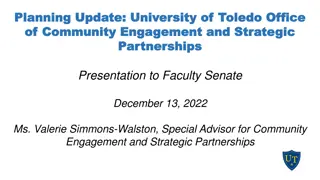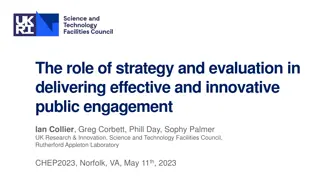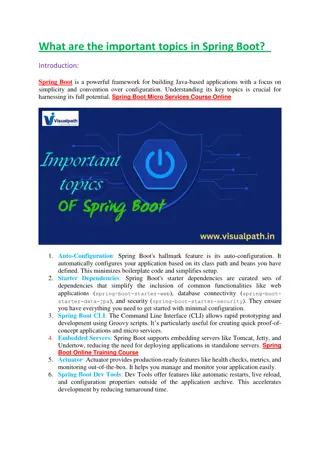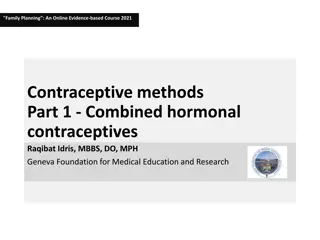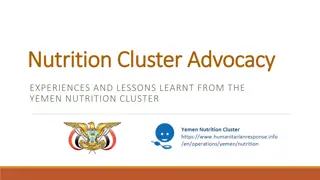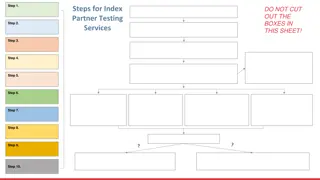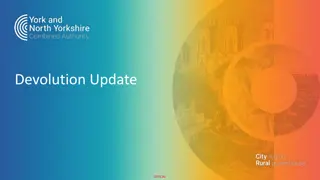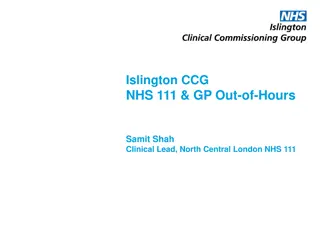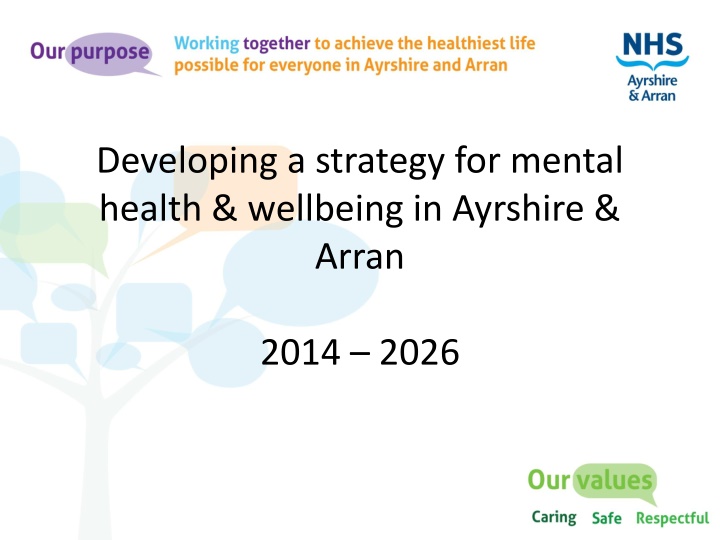
Mental Health & Wellbeing Strategy for Ayrshire & Arran: 2014-2026
Developing a comprehensive strategy for mental health and wellbeing in Ayrshire & Arran from 2014 to 2026. The strategy focuses on key outcome areas, evidence-based activities, risks and challenges, action planning, and monitoring and evaluation. It emphasizes a life course approach, engagement events, and sustaining inner resources for different age groups. Key aspects include promoting individual mental health, resilience, coping with everyday stress, and fostering purpose and optimism. Social connectedness is highlighted as a crucial factor in enhancing mental health across different community settings.
Uploaded on | 0 Views
Download Presentation

Please find below an Image/Link to download the presentation.
The content on the website is provided AS IS for your information and personal use only. It may not be sold, licensed, or shared on other websites without obtaining consent from the author. If you encounter any issues during the download, it is possible that the publisher has removed the file from their server.
You are allowed to download the files provided on this website for personal or commercial use, subject to the condition that they are used lawfully. All files are the property of their respective owners.
The content on the website is provided AS IS for your information and personal use only. It may not be sold, licensed, or shared on other websites without obtaining consent from the author.
E N D
Presentation Transcript
Developing a strategy for mental health & wellbeing in Ayrshire & Arran 2014 2026
Background Developed by Mental Health Leadership Group and Infant Mental Health Group Based on National Outcomes Framework for Mental Health Improvement and National Mental Health Indicators (NHS Health Scotland) strong evidence base, key areas unlikely to change Direction of travel indication of key areas for activity without being proscriptive; recognition that it will take time to effect change (3 year action plans within strategy) Life course approach infants, children & young people, working age adults, older people Series of engagement events held Oct 2013 across Ayrshire and Arran
Format of strategy Main strategy document Short overview of strategic direction 3 key outcome areas with specific areas for activity Supporting evidence fact file Summary of epidemiology and available evidence to inform theory of change based on major areas of activity which are expected to contribute to mental health improvement Risks and challenges to theory Focus action planning process and monitoring & evaluation Test, revise and (hopefully) strengthen theory of change Population mental health report Baseline data for strategy repeat to assess population effects
Sustaining inner resources Children & young people: Information for prospective mums and dads on getting to know their baby Antenatal and perinatal support to promote bonding and attachment Parenting approaches and programmes Childcare and nursery settings School-based programmes Activities that promote mental health and wellbeing in the community Responding to difficulties Working age adults & older people: Activities that promote mental health and wellbeing Social prescribing Volunteering Tools to improve and maintain mental health Public information campaigns Training for professionals and volunteers Organisational cultures that support mental health and wellbeing Key aspects: Individual mental health Resilience to cope with everyday stresses Purpose and optimism
Social connectedness Children & young people: Play Initiatives to support breast-feeding Children and young people s involvement in asset-based community development Raising awareness of positive role of adults Intergenerational activities Support healthy relationships Raising awareness of benefits and risks of social networking Working age adults & older people: Key aspects: Better social support and networks Asset-based community development Environmental improvement Increased community participation and trust Build community empowerment to influence services/ community advocacy Social support interventions Healthier relationships Support healthy relationships
Mentally healthy environments for working and learning Children & young people: Support children to reach developmental milestones Promote mental health and wellbeing aspect of Curriculum for Excellence Counselling and advice through educational settings Mental health training for professionals and volunteers to support CYP Re-engagement with education Working age adults & older people: Key aspects: Mentally healthy schools (CYP sections) Encouraging a range of learning opportunities Learning and development opportunities Workplace policies, procedures and programmes to support employees Mentally health workplaces Financial inclusion (Financial security)
Next steps Engagement with partners Approval of draft strategy Public consultation Development of first 3-year action plan with partners



